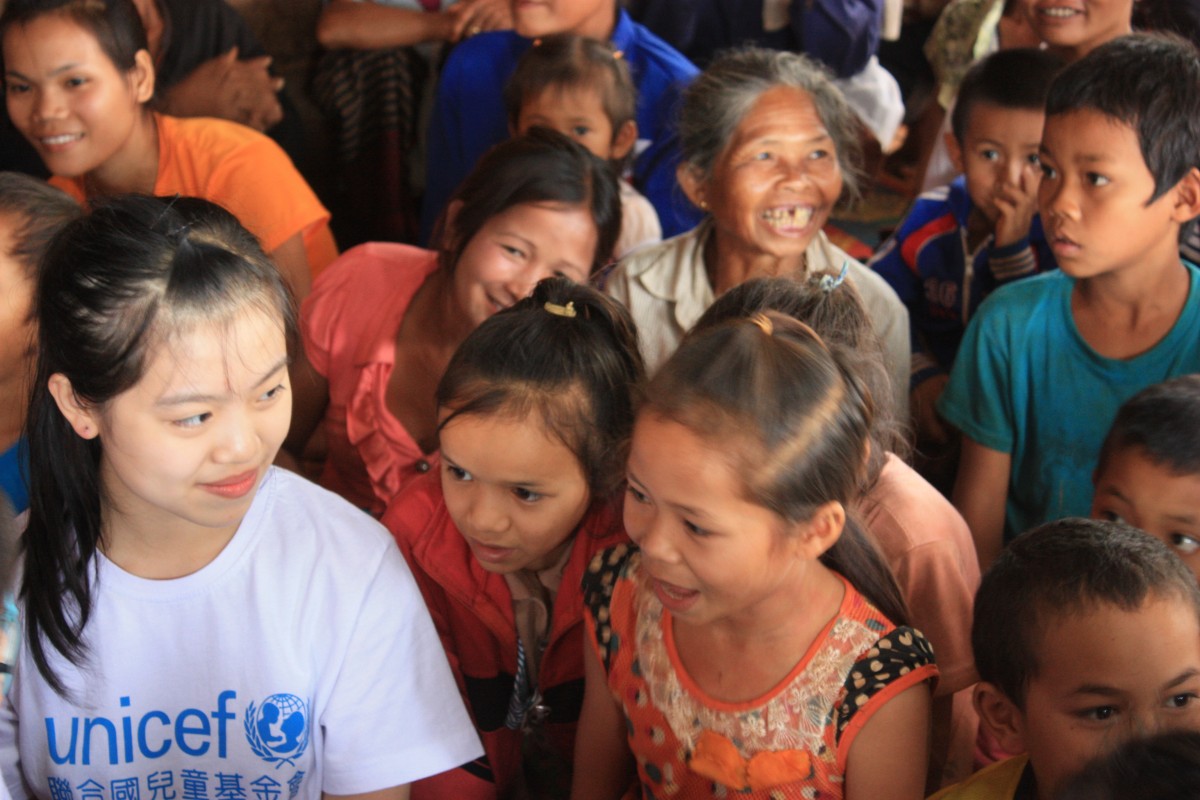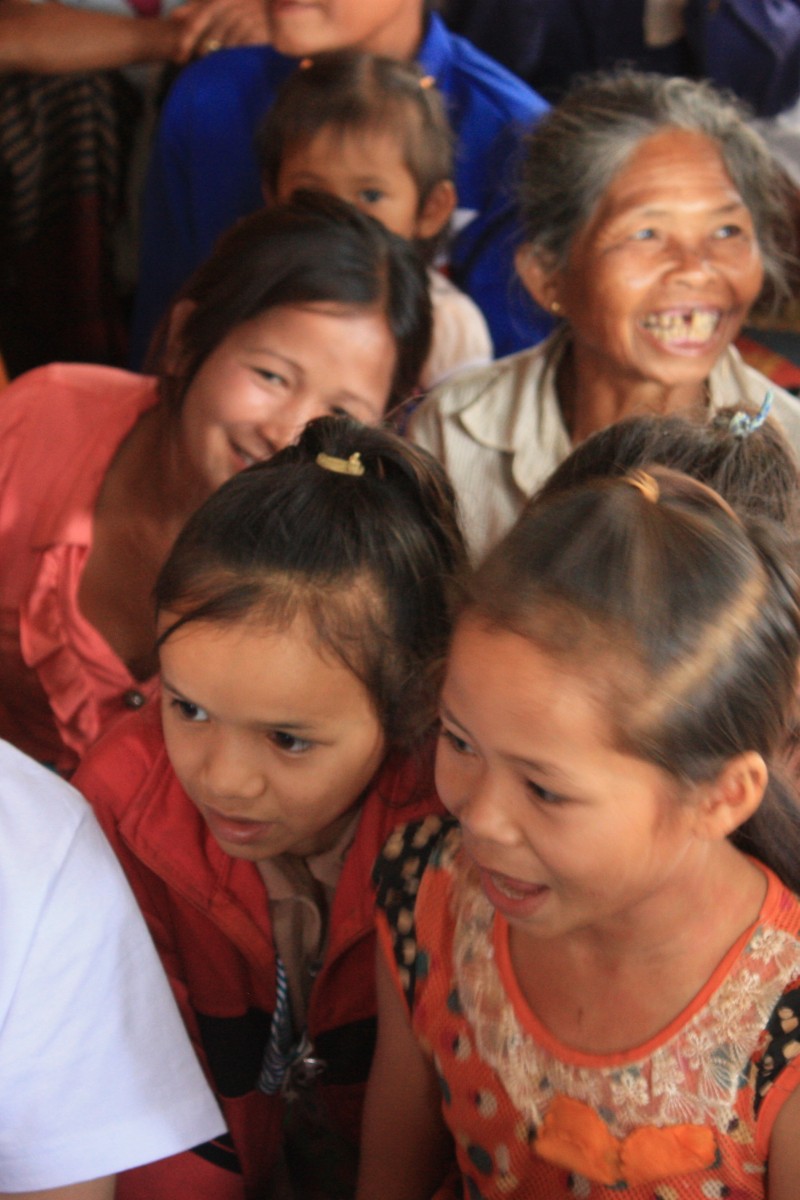 Village children gather round Young Envoy Hillary Chung.
Village children gather round Young Envoy Hillary Chung.In Hong Kong, life is easy. When we want water, we turn on the tap. There are restaurants and supermarkets on every corner, and we can take the MTR almost everywhere. But not everyone has such an easy life, as 25 local teenagers learned when they travelled to Laos under Unicef Hong Kong’s Young Envoys programme in July.
The Young Envoys went to Saravane province in the south, where they visited small, remote villages and learned about projects Unicef Laos has been working on.
The first visit was to Dongka Neua village, where Unicef has been working on the Water, Sanitation and Hygiene (Wash) programme. This programme provides sources for clean water by setting up water pumps in villages that don’t have easy access to water. The 375 people who live in this village have only four water pumps to get all of their water. Pumping is hard work, as the Young Envoys found out when they tried to fill a bucket.
For Hillary Chung Kei-yau, 15, a student at Diocesan Girls’ School, seeing the villagers carry the heavy buckets of water from the pumps was a new experience . “They said the two buckets of water were for the whole family for the whole day,” she said. “That was really surprising. I couldn’t help but imagine [what would happen] if the woman tripped while she was carrying the bucket. She’d have to go back and start all over again.”
Rachael Yu Ching, 14, from Belilios Public School, agreed: “All we need to do is turn on the tap. They have to wait for a whole day to queue for clean water. We really take things for granted.”
Unicef Laos plans to build two more pumps for the village, and will bring water sources to 30 villages in the area, which will help about 5,000 people to get clean water.
The other target of Wash is to provide toilet facilities to village schools.
Hygiene is important, and proper toilets and sanitation can help prevent a lot of the illnesses that keep children out of school. In Saravane, less than 60 per cent of children finish primary school, and only 20 per cent go to secondary school. Part of the reason for this is that some children need to work, but sanitation and health also play a big role.
Almost 80 per cent of people in Saravane defecate in the open. Without proper toilet facilities, there is no other choice. Many health problems arise from this practice, and illnesses spread quickly, especially at schools. Many children miss school or end up dropping out because of such sicknesses.
New toilets, such as the one the Young Envoys went to see at the Dongka Neua primary school, not only help keep students healthy, but also pave the way for teaching the new generation about the importance of hygiene. Since open defecation has become a cultural practice in the villages, it’s up to the children to change this habit, and hopefully start a healthier trend.
Not having access to a toilet and proper washing station also causes problems for girls once they hit puberty. Unicef Laos communication officer Simon Nazer explained that many teenage girls drop out of school once they start their periods. He hopes that with the new toilets set up by the Wash program will save these girls the embarrassment of having to deal with their periods in the openness of the jungle, and provide them with the facilities to discretely and hygienically care for their bodies while at school.
But the Wash programme is only part of how Unicef is helping villagers in Laos. The Young Envoys also got to see first hand how Unicef Laos is helping with nutrition. In Ban Hisok village, the students sat alongside the villagers and watched how micro-nutrient powder – a powder containing essential vitamins and mineral often lacking from the villagers’ diets – is used in cooking.
In Saravane, the growth of more than half of the children is stunted because they lack proper nutrition. Mothers there don’t tend to breastfeed, so many babies miss out on essential nutrients from birth. Teaching the mothers and children about the micro-nutrient powder is a first step in promoting better health. Nazer explained that a big part of the project was education. “Changing small habits can make big differences,” he said.
Sitting beside the villagers, the Young Envoys were surprised at how welcome they felt. They were able to take part in the cooking displays, and even The Young Envoys helped the mothers feed their babies with the meal made from the micro-nutrient powder.
Sherman Lam Sheung-hang, 16, from Good Hope School, admits she was worried at first that they wouldn’t be able to communicate with the villagers. But once the Young Envoys taught some of the young children how to play Rock, Paper, Scissors, it was easy to get along. “It was just a simple game,” Sherman says, “but we all laughed so much. Language is never really a barrier between people.”
It didn’t take long before the Young Envoys were laughing, playing, and even singing and dancing with local children.
Josephine Lam Wai-may, 16, from King George V School, said that reaching out was simple: “When you smile and they smile back, you feel connected.”
Want to take part?
Unicef Hong Kong is now taking applications for Young Envoys 2015. You must be between 12 and 18 years old and a full-time secondary school student.
Application deadline: October 31
For more information, visit: www.unicef.org.hk/youngenvoys
